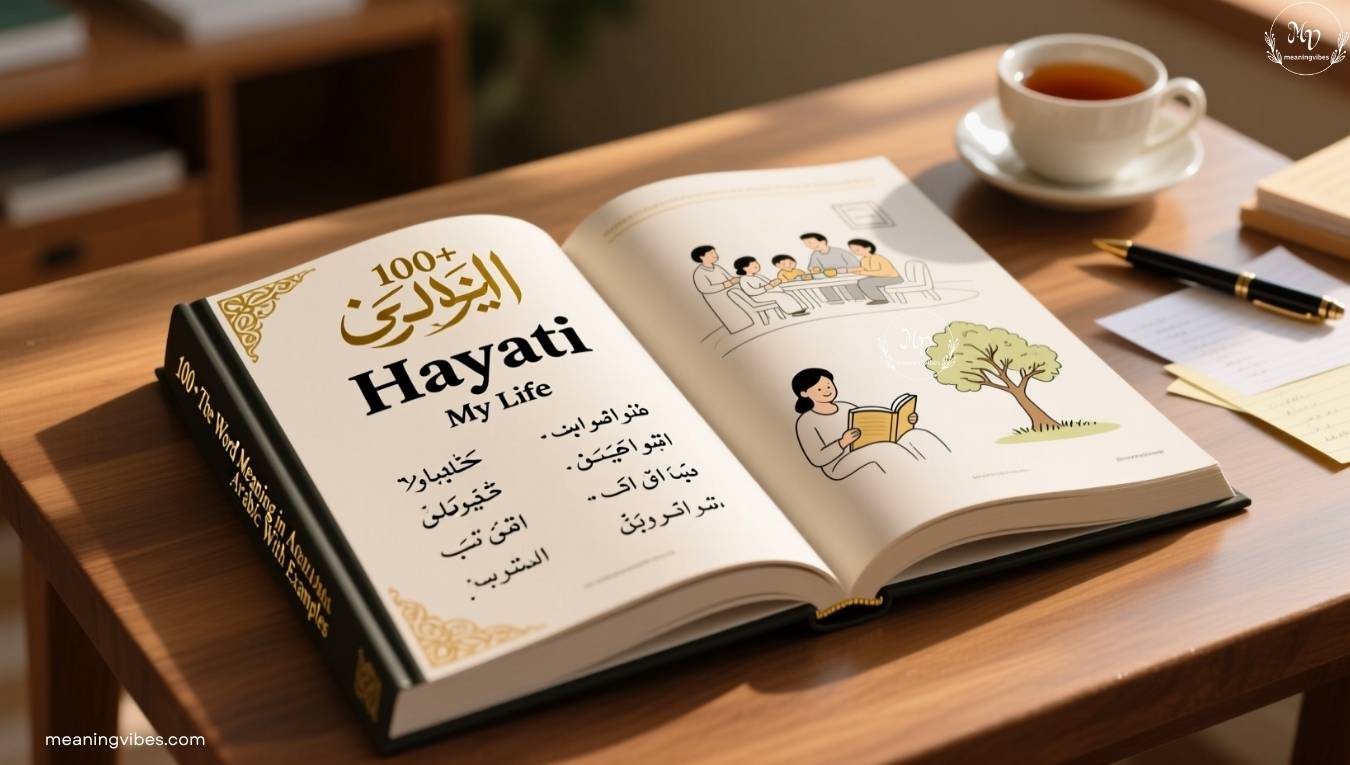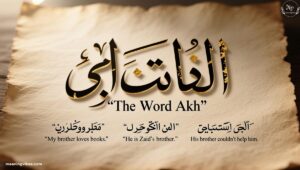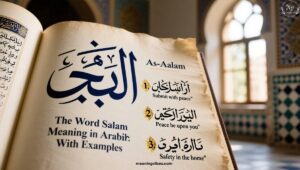Have you ever heard someone say “ya hayati” and felt curious about what it means? Many people search for the hayati meaning in Arabic after hearing it in songs or love quotes, wondering why it sounds so heartfelt. Whether you’re comparing the hayati meaning in Urdu or just trying to understand the real meaning of hayati, this word holds more emotion than it seems.
In this post, we’ll explore the Hayati Meaning in Arabic and uncover its true charm. You’ll learn how hayati in Arabic is used, what ya hayati meaning really expresses, and why it’s one of the most beautiful phrases of love and connection in the Arabic language.
What Does “Hayati” Actually Mean?
The literal meaning of hayati is “my life.”
It’s derived from the root word hayah (حياة), which means life. When you add the possessive suffix “-i”, it becomes hayati, meaning “my life.”
This makes it a term of affection and love, often used between partners, family members, or very close friends. It’s similar to how English speakers might say “my love” or “my darling.”
Example Usage:
- “Enta hayati” (أنت حياتي) – You are my life
- “Ya hayati” (يا حياتي) – O my life!
The Meaning of “Hayati” in Arabic
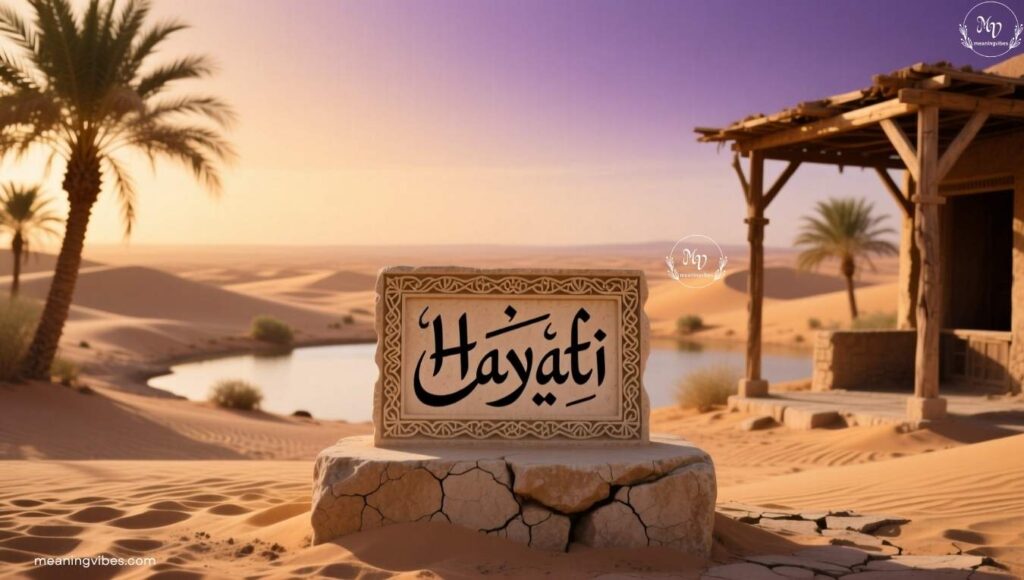
The hayati meaning in Arabic goes beyond the dictionary. It expresses deep emotional connection. When someone calls you “hayati”, it means you are precious , the center of their world.
This word can convey love, appreciation, or heartfelt care depending on the context. In Arabic, it’s common to say “Ya hayati” in songs, poems, and even everyday greetings.
Quick breakdown:
- Root: ح-ي-ي (H-Y-Y) → related to life
- Word form: حياتي (hayati)
- Literal meaning: My life
- Emotional meaning: My love, my dear, my everything
Linguistic Root and Grammatical Usage
Understanding the grammar of hayati helps clarify how Arabic expresses possession and affection through structure.
| Base Word | Arabic Script | Translation | Usage |
| Hayah | حياة | Life | Root noun |
| Hayati | حياتي | My life | Possessive noun |
| Ya Hayati | يا حياتي | Oh my life | Vocative form |
How Possession Works in Arabic
Arabic adds personal pronouns to nouns directly. The suffix “-i” means “my.”
So, hayah (life) + -i (my) = hayati (my life).
This follows the same rule as:
- Habibi (حبيبي) – My love
- Qalbi (قلبي) – My heart
- Rohi (روحي) – My soul
In all cases, adding the suffix personalizes the meaning , making it warm, emotional, and intimate.
Examples of “Hayati” in Arabic Sentences
Here are common ways hayati appears in Arabic speech and writing:
| Arabic Sentence | Transliteration | English Meaning |
| أحبك يا حياتي | Uhibbuka ya hayati | I love you, my life |
| صباح الخير يا حياتي | Sabah al-khair ya hayati | Good morning, my life |
| أنت حياتي | Anta hayati | You are my life |
| اشتقت لك يا حياتي | Ishtaqtu laki ya hayati | I missed you, my life |
| حياتي كلها لك | Hayati kulluha lak | My whole life is yours |
The Expression “Ya Hayati” , A Closer Look
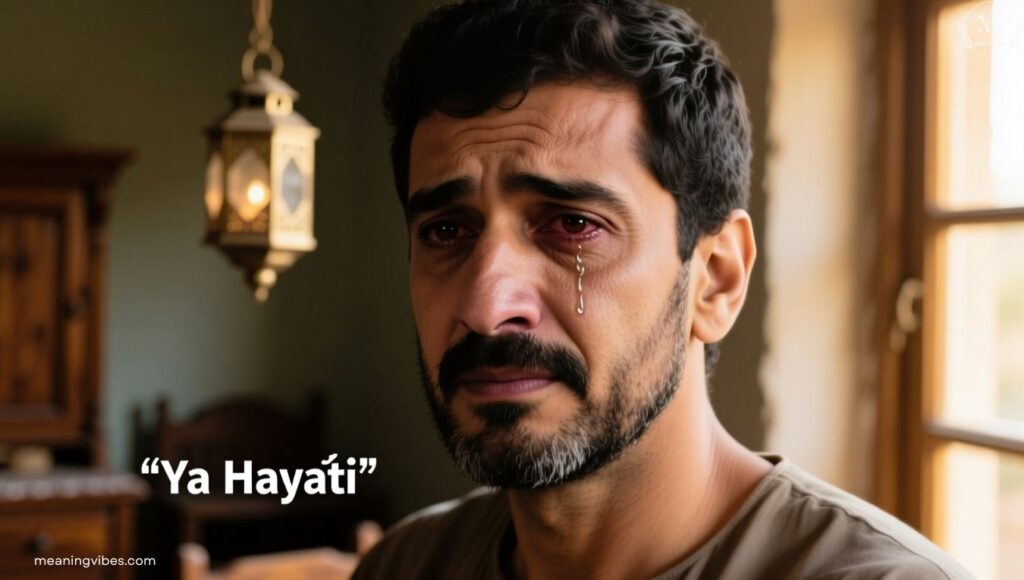
The word “Ya” (يا) in Arabic means “O” or “Oh.”
When combined with hayati, it forms “ya hayati”, literally meaning “O my life.”
Common Uses of Ya Hayati
- In love songs: “Ya hayati, don’t ever leave me.”
- In daily speech: Between couples or close family.
- In poetry: As a symbol of deep emotional devotion.
Ya hayati meaning therefore is both literal and poetic, expressing affection and emotional attachment.
Cultural or Quranic Significance of “Hayati”
While hayati doesn’t appear as-is in the Qur’an, its root , hayah (life) , holds deep spiritual meaning.
In Islam, life (الحياة) is a sacred gift from Allah, and the Qur’an often uses the term to describe the divine value of existence.
Cultural Reflections
In Arabic culture:
- Words like hayati, habibi, and qalbi are everyday expressions of affection.
- Families use them to show love and warmth.
- Romantic partners use them to express closeness and passion.
For example:
A mother might call her child “hayati.”
A husband might say “ya hayati” to his wife.
Both express love, though the tone differs.
Arabic vs. Urdu: Hayati Meaning in Urdu
In Urdu, the term “hayati” (حیاتی) also exists, borrowed from Arabic.
Its meaning in Urdu is “life” or “existence.”
However, Urdu speakers sometimes use “hayati” in the same emotional way as Arabic speakers , especially in poetry and romantic language.
| Language | Script | Meaning |
| Arabic | حياتي | My life |
| Urdu | حیاتی | Life, existence |
| Emotional sense | , | My love / my life |
So, the hayati meaning in Urdu aligns with Arabic, especially in emotional or poetic contexts.
Other Arabic Love Words Similar to “Hayati”
Arabic is rich with romantic expressions. Here are some that share similar warmth:
| Word | Arabic | Translation | Usage |
| Habibi / Habibti | حبيبي / حبيبتي | My love | Romantic, friendly |
| Qalbi | قلبي | My heart | Deep affection |
| Rohi | روحي | My soul | Emotional or poetic |
| Amri | أمري | My concern | Used lovingly |
| Omri | عمري | My life / age | Romantic phrase like “my life” |
Each of these carries its own emotional layer, but hayati stands out for its simplicity and tenderness.
Common Misunderstandings or Mistakes
Many beginners confuse hayat, hayati, and ya hayati.
Let’s fix that clearly:
| Mistake | Correct Form | Explanation |
| Saying hayat for my life | Use hayati | “Hayat” = life, “Hayati” = my life |
| Overusing ya hayati | Use with close ones | It’s an affectionate term |
| Translating it too literally | Understand emotional tone | “My life” often means “my love” |
Also, hayati is gender-neutral , it can refer to both men and women.
The Emotional Power of “Hayati”

When someone says “ya hayati,” it’s not just a word , it’s a feeling.
It’s how Arabs express that someone gives meaning to their life.
In relationships, using hayati adds tenderness and emotion.
You’ll hear it in romantic songs, heartfelt conversations, and family interactions alike.
For example:
“Good night, ya hayati.”
“I missed you so much, hayati.”
These small phrases carry deep warmth and sincerity.
“Hayati” in Songs, Movies, and Everyday Life
Arabic songs often use hayati to express passion and emotional depth.
Famous examples include lyrics like “Enta hayati, ya habibi” , “You are my life, my love.”
In movies and TV dramas, characters use “ya hayati” naturally when showing affection.
Even outside of romance, it can reflect care and closeness.
Arabic Grammar Note: The Root System (H-Y-A)
Arabic words often come from three-letter roots.
The root of hayati , ḥ-y-y (ح-ي-ي) , connects to meanings of life, living, and vitality.
From this root come words like:
- Hayah (حياة) – Life
- Ahya (أحيا) – To give life
- Hayy (حيّ) – Alive
- Hayati (حياتي) – My life
This root-based system gives Arabic its poetic, interconnected nature , each word carries layers of meaning.
Using “Hayati” in Conversation
Here’s how you can use hayati in Arabic naturally:
Romantic Settings
- “I miss you, ya hayati.”
- “Good morning, hayati.”
- “You’re everything to me, hayati.”
Family or Friendship
- “How are you, hayati?” (used for a child)
- “You’re my world, hayati.”
It’s all about tone and context , Arabs understand emotional depth from the way it’s said.
Learning Arabic Through Words Like “Hayati”
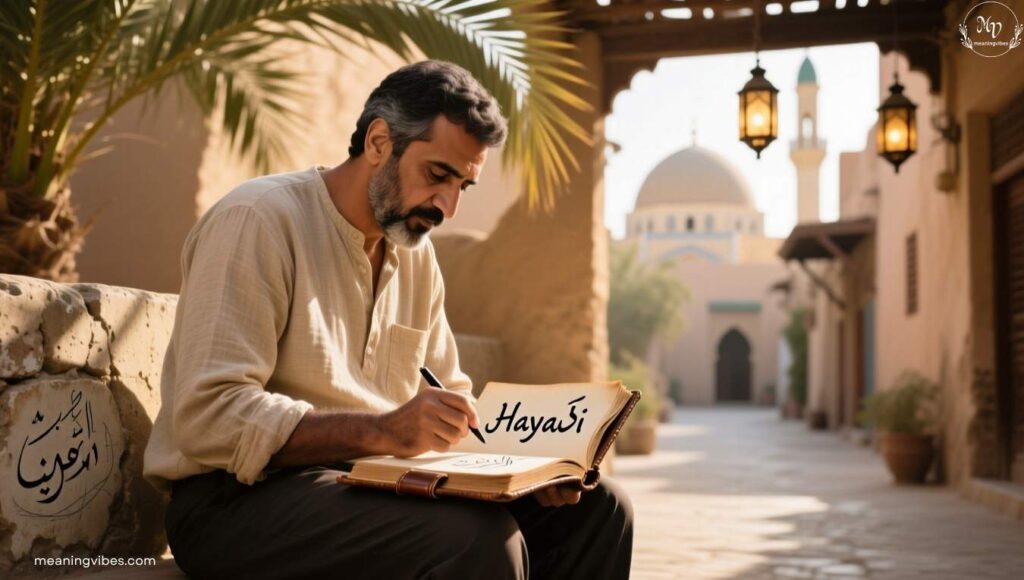
If you’re a learner, words like hayati can make your study more personal and engaging.
Tips for learners:
- Learn possessive forms (my, your, his/her) in Arabic.
- Practice phrases like “habibi,” “hayati,” and “qalbi.”
- Listen to Arabic love songs to get natural rhythm.
- Study the root patterns to understand word families.
Learning emotional words helps you speak Arabic more naturally and expressively.
Table: Comparing Arabic Affectionate Terms
| Expression | Arabic Script | Meaning | Context |
| Hayati | حياتي | My life | Romantic or familial |
| Ya Hayati | يا حياتي | Oh my life | Loving call |
| Omri | عمري | My life / age | Romantic |
| Rohi | روحي | My soul | Deep emotional |
| Qalbi | قلبي | My heart | Romantic/friendly |
| Habibi | حبيبي | My love (male) | Common term of endearment |
| Habibti | حبيبتي | My love (female) | Common term of endearment |
Why You Should Learn “Hayati”
Learning hayati meaning in Arabic gives you more than just vocabulary , it connects you emotionally to the culture.
Here’s why:
- It’s one of the most commonly used Arabic endearments.
- It helps you understand Arabic grammar (possessive suffixes).
- It improves your listening and comprehension of songs and films.
- It deepens your appreciation for Arabic emotional expression.
Mastering words like hayati, habibi, and rohi makes your Arabic sound authentic, heartfelt, and natural.
Frequently Asked Questions
What is the Hayati Meaning in Arabic?
“Hayati” Meaning in Arabic is “my life,” a loving phrase showing deep care, emotion, and affection.
What does Ya Hayati mean in Arabic love songs?
In Arabic songs, Hayati Meaning in Arabic becomes emotional; ya hayati means “oh my life,” expressing love.
Is Hayati Meaning in Arabic the same as Hayati Meaning in Urdu?
Yes, “Hayati” Meaning in Arabic and hayati meaning in Urdu both mean “my life,” showing strong affection.
How do you use Hayati in Arabic sentences?
You can say “ya hayati” to mean “oh my life,” showing love; that’s Hayati Meaning in Arabic.
Why is the Hayati Meaning in Arabic popular worldwide?
Because Hayati Meaning in Arabic expresses love beautifully, people use it often in songs and relationships.
Conclusion
The phrase hayati meaning in Arabic is more than just a simple translation. It’s a word full of warmth and love. When someone says ya hayati, they are saying “my life” with deep emotion. The meaning of hayati shows how Arabic expresses affection in beautiful ways. Many people search for hayati meaning in Urdu too, and it carries the same sweet feeling.
Learning the Hayati Meaning in Arabic helps you understand not just a word but a piece of culture. You’ll hear hayati in Arabic songs, movies, and conversations all the time. Whether you say ya hayati to a loved one or read it in poetry, it always feels special. The hayati meaning in Arabic reminds us that love, life, and language are beautifully connected through heartfelt words.
Watch a sample class below

I’m the creator of meaningvibes.com, sharing positivity and purpose for over 3 years. With 50+ happy clients, I help people and brands find the right words, deep meanings, and good vibes that truly connect.
